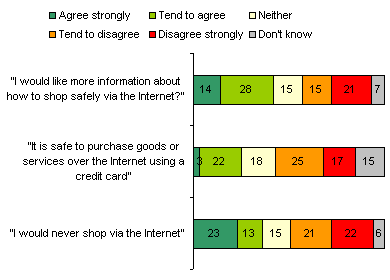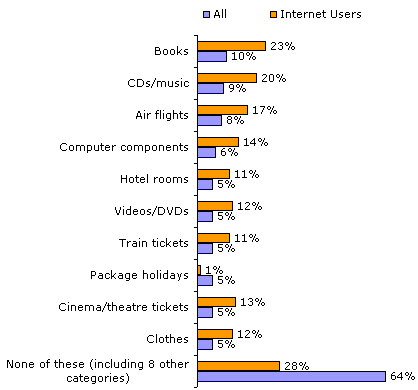Clicking With Confidence?
VOX POP, Profile
One person in four say they have bought goods or services on in internet during the last 12 months, according to a MORI survey for the Department of Trade and Industry released at the end of November. This is approximately 12 million British adults. And it is despite the nearly half of all internet users who admit to concern about credit card fraud, and a third, 32%, who are anxious about giving out personal information.
I recall when I arrived in this country, over thirty years ago, when just over half the public had a telephone at home, and this was under a third of people in the working class, then two thirds of the electorate. Now two thirds have mobile phones, over nine in ten have landline telephones at home, and the working class is about one family in two. In fact, between 1979, when Mrs. Thatcher was first elected, and 1990, when she left office, the middle-class families in Britain leapt from a third of the electorate to nearly half, the biggest change in social class in a decade in a thousand years in English history.
Nearly half of the public, 47%, agree they 'would never shop via the internet', while fewer, 43%, disagree. Even among the 37% who use the internet now, 17% say they would never shop on line. Of these, four in ten (and slightly more, 43%, of the public) disagree that it is safe to purchase goods or services over the internet.
Attitudes to Purchasing on the Internet
Q "To what extent do you agree or disagree with each of the following statements?"

Base: 2,013 British adults aged 15+ in-home face-to-face 20-25 September 2001 (DTI)
Of those who do not use the internet, nearly two thirds of the public, nearly four in ten disagree that it is safe, and another one in five aren't sure, and may have the view that better be safe than sorry.
I have bought several things recently on the internet, including books, tickets, hotel reservations, and just last week, some doll furniture for my granddaughter's seventh birthday, which arrived yesterday. So far, so good, but I'll confess, I never send off the details of my VISA card without wondering how long my luck will last.
I'm not alone. Among internet users, nearly a quarter have bought books, 23%, one in five CDs/records, 14% computer components and 5% computers themselves, and others in the chart below, including fewer than 5% who have bought electrical entertainment and white goods, computer systems, cars cosmetics, food and medicine/health products.
What's Being Purchased on the Internet
Q "...which goods or services have you personally purchased or used via the internet in the last 12 months?"

Base: 2,013 British adults aged 15+, 20-25 Sept 2001, including 727 internet users
Other on-line activities that people who use the net which they are willing to admit to (the most popular sites are said to be porno sites) include searching for information (53%), banking (24%), listening to music (19%), chat rooms (16%), watching videos (8%), auctions (5%) and gambling (1%).
Of those who have bought via the net or used an auction, one in five, 21%, say they've done so more than ten times in the past year, another one in five 6 -- 10 times, over a third, 35%, 2-5 times and 16% only the one time. Of the total sample of non internet users, 8% say they think it is likely that they'll join the club by personally purchasing goods or services via the internet over the next 12 months, which if they do, will bring users up to some 35% of the adult population.
Awareness is high, with over 90% of British adults, and no doubt a higher proportion of younger people aware that there's information for the searching and people to chat with, shopping and banking available via the net, and more than 60% aware that there are videos to be watched on the net and even gambling on offer (63% each).
Of course as this develops, it will have a larger and larger impact on the retail high street stores and their trade, which is why for defensive protection if nothing else, the retail chains are pouring money into websites, and why nearly every retailer's ads these days have the store's web site address. People tell us that internet shopping is more convenient (54is more convenient (54%), means time saved (47%) less queuing (40%) and three in ten, 29%, say they've found goods they've bought cheaper on the net than in the high street.
Barriers are as noted above, worries about credit card fraud (47%), having to give out personal information (32%), subjecting themselves to spam (24%) and worries that you can't see what you've buying, also 24%.
When asked what would make them more likely to shop on the internet, web browsers told us that they would 'if security was improved overall (33%), if internet companies offered a guarantee against credit/debit card fraud (32%) or if the banks did (28%), and/or if goods were cheaper that they could find in the shops (31%). A quarter, 24% each, said if next-day delivery was guaranteed and/or if it was easy to return goods.
There's no doubt that internet shopping is here to stay, and will continue to grow, if perhaps not at the same rate as this past year. This will come of course not only from those taking part in the survey and the millions like them, but also from the under 15s who are ahead of their parents, and certainly their grandparents only 8% of whom are on the net, are added to the British nation of [internet] shoppers.



